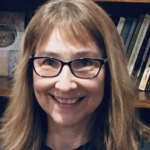 Maggie B.
Moderator Pick
Maggie B.
Moderator Pick
Be Skeptical . . . But Not Dismissive
As a middle school librarian, I find that many students fall into one of two categories: they believe almost everything, or they believe almost nothing. Everything is true, or everything's a lie. Facts are self-evident, or facts are impossible to divine. Reality is absolute, or reality is whatever you want it to be. It's difficult to teach (or convince) someone how to walk a line between these two extremes; to be skeptical without being entirely dismissive of even the possibility of credibility.
15 years into my career as a librarian, I see more and more students falling into the second category. This current generation has been taught repeatedly that they can't trust anything on the internet or in the media. They also hear from the adults around them that all politicians (and, by extension, all people in positions of power) lie--and, what's more, that lying is normal and inevitable.
I think sometimes we K-12 librarians focus too much on teaching students strategies for evaluating information and resources--the


The world of absolutes, is by some measures, a product of a high-stakes testing system of education. The answer is always A, B, C, or D. In real life, the answer may be part of all 4, or some other combination. I do still think evaluating information and resources is a valuable skill, but I understand the need to teach that there can be a spectrum.
Yes, I agree. While we should assess what we value, we often value what we assess instead. Unfortunately, we usually assess what's easy to assess. Assessing critical thinking as well as divergent thinking is difficult, so too often it just doesn't happen. I think students have been so over-tested that many of them have become motivated almost exclusively by grades, not by learning. It's understandable--why wouldn't they measure themselves in the way they've been measured by others all of their lives? So, they constantly want to know exactly what they need to do to get an A (or maybe to pass)--instead of really engaging with material. We need to de-emphasize grades and testing so that students can focus on learning.
This is why I am a proponent of the "Maker" model of learning. Instead of teaching a subject to meet criteria of school system, I teach the youth what they want to learn while providing lessons in the subjects they would normally find less than interesting if not presented in a creative and stimulating environment.
Many students find it hard to be unreasonably skeptical when given a chance to experience a lesson rather than just being presented with the lesson.
I agree that when they have a voice/choice and the learning is relevant to their needs and interests (authentic learning), kids respond much better. Same is true for adults, for that matter.
I think every school librarian wants to live in that magical world where we can just teach genius hour and check out books! So glad you're able to have so much freedom.
Wow. That is distressing to hear. But I guess I'm not surprised that would be the result of our public discourse.
How does your work with the students change the way they look at information? How do you measure the success of your approach to helping students think more deeply?
That is a FANTASTIC and very important question. While it's relatively easy to measure how successful students are at determining the value of algebraic equations, it not nearly as easy to measure how well students are able to evaluate information, and even more difficult to assess deep/critical thinking. For one thing: one of the biggest barriers to students (or anyone) accurately determining the credibility of a source is their willingness to attempt to do so. In other words, if I assign students sample articles and ask them to determine whether the information in them is credible, most of them, with just a little training, are quite capable of making accurate calls most of the time. But this doesn't necessarily translate to students doing this work when they are not prompted to do so (or when a grade is at stake). As far as assessing critical thinking? To be quite honest, this is something I need to work on. Right now, I rely mostly on discussion participation to informally and formatively assess critical thinking--but for obvious reasons, this isn't ideal. I've actually spent time working on and thinking and writing about how to assess creativity, which is a related issue, but not exactly the same. Thank you for making me think about this! I'm inspired to figure out how to do a better job of it. As I have done with my work on assessing creativity, the first step will be to clarify a definition of critical thinking--which involves breaking it down into components--and then considering what observable behaviors are associated with each identified component. I'd love to hear what you or anyone else thinks is part of the critical thinking process, as well as how we might observe when it's happening! Another possibility might be doing an ungraded post-course survey where students can self-assess their learning.